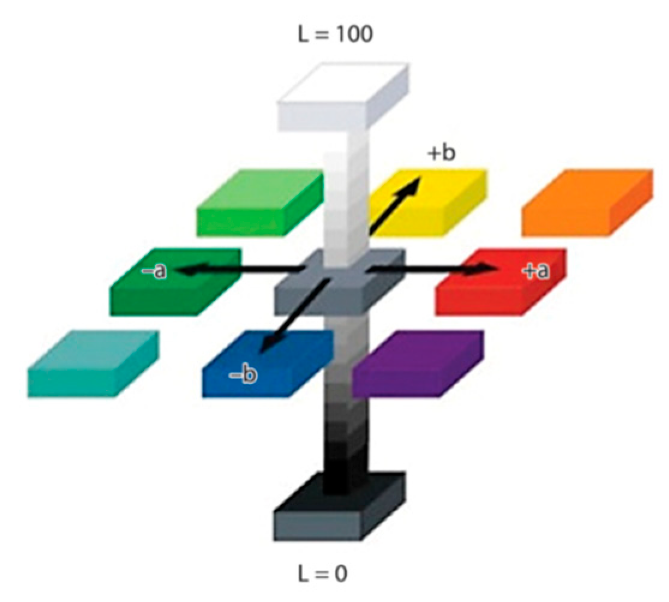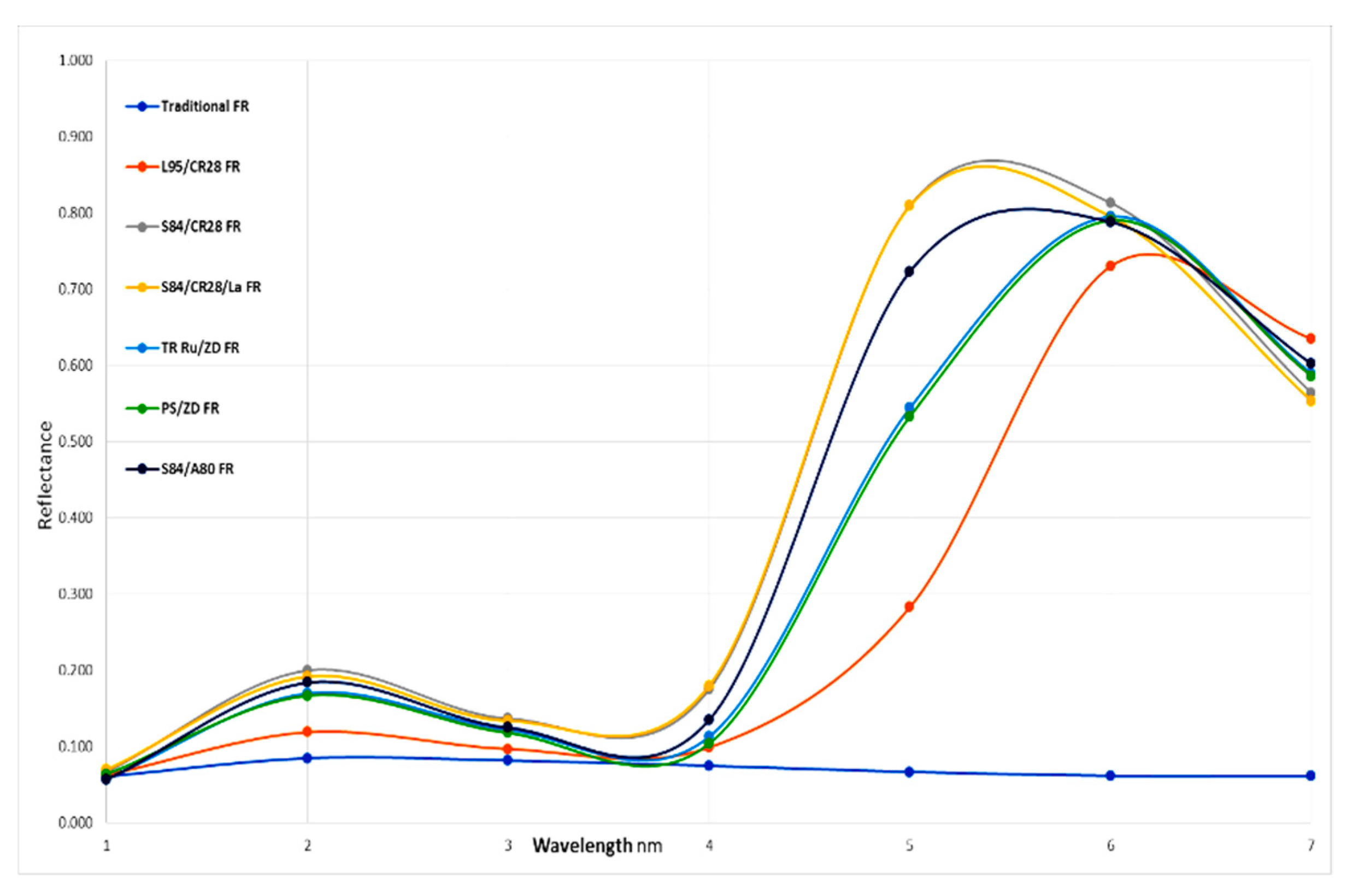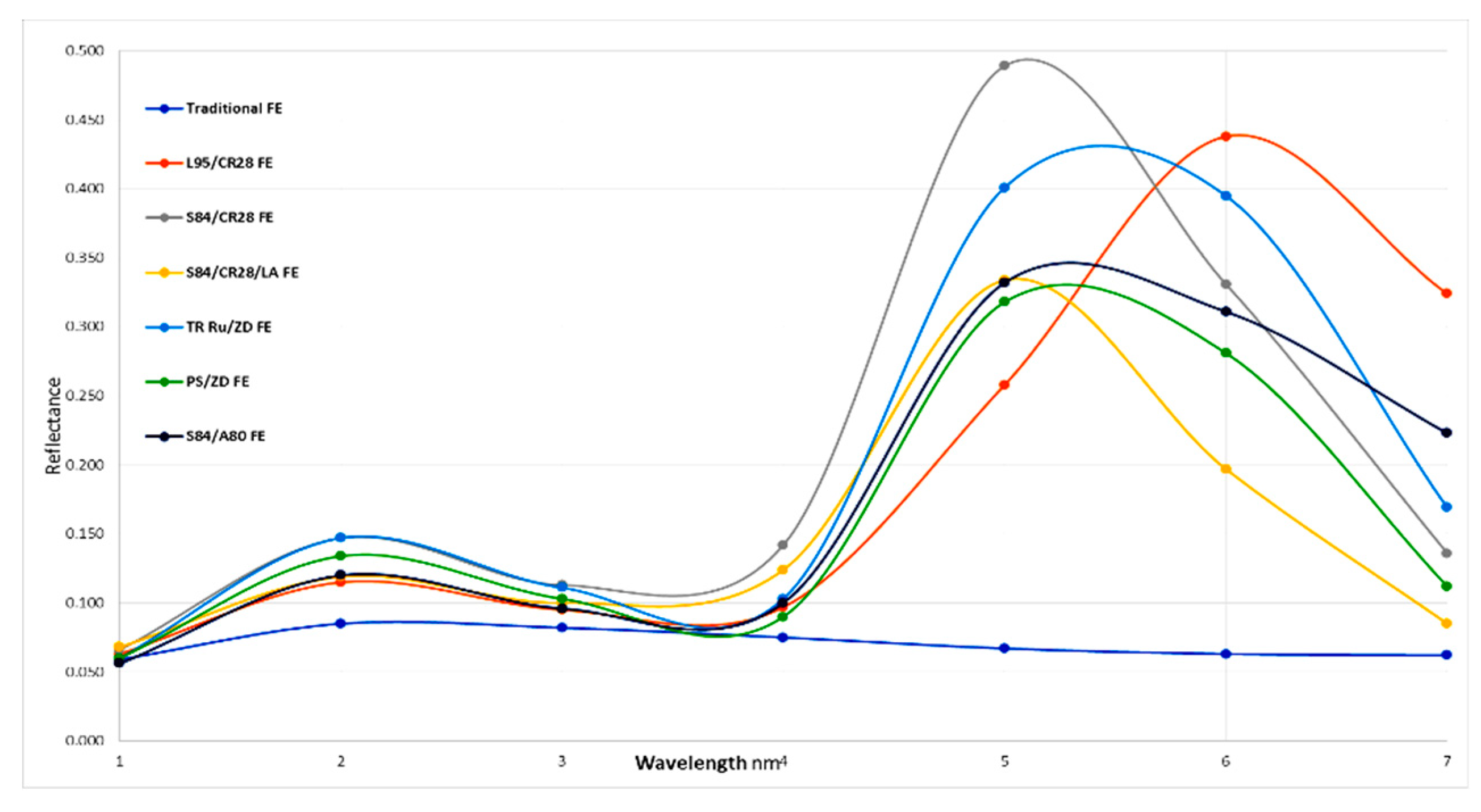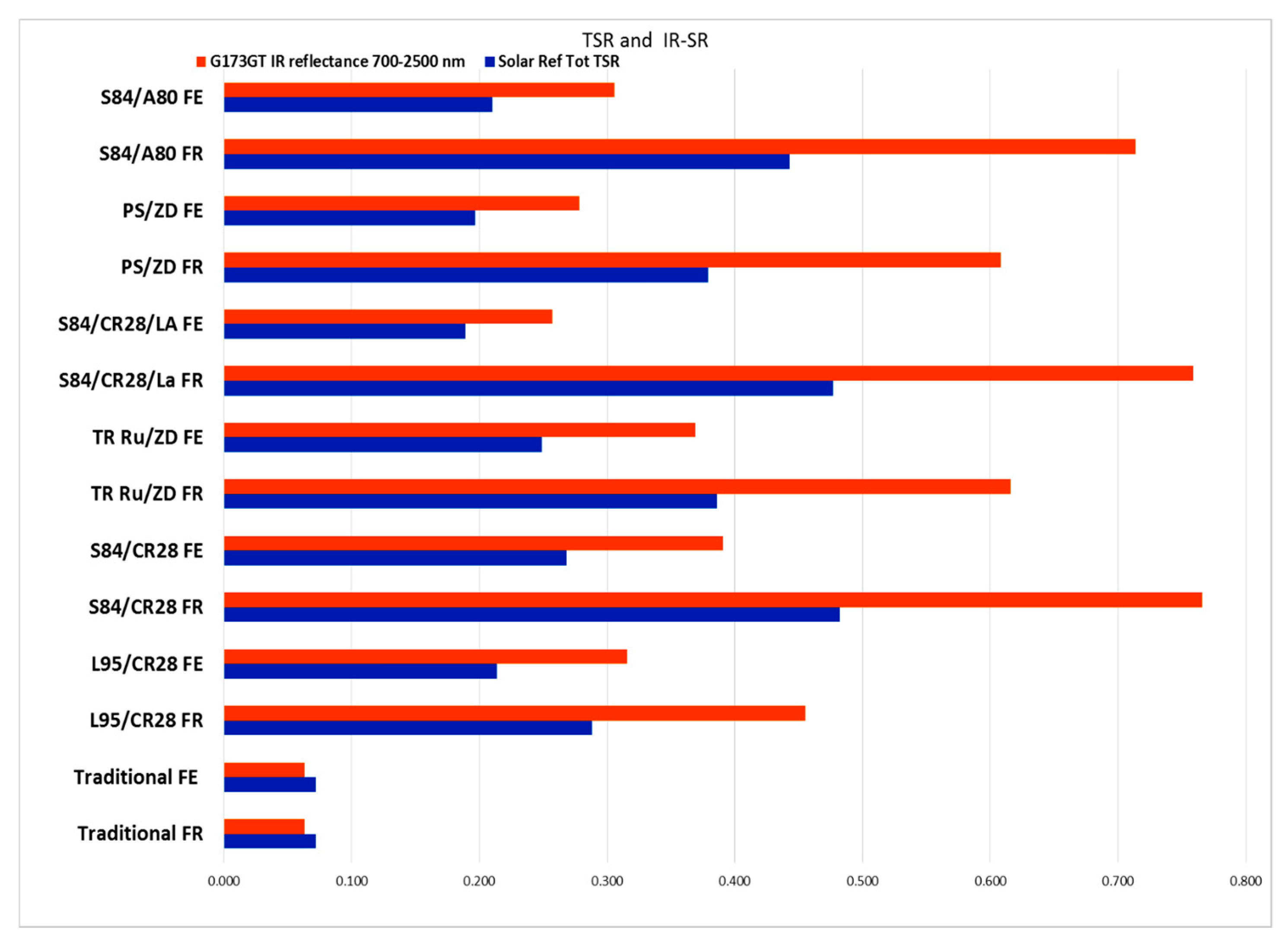Submitted:
11 October 2023
Posted:
11 October 2023
You are already at the latest version
Abstract
Keywords:
1. Introduction
- Metals: gold, silver, aluminum, aluminum foil, metallized thin films;
- Infrared inorganic pigments [14];
- Black pigments (perylene black that does not absorb in near infrared wave range)
- Low-emissivity coatings: they can reflect and absorb infrared and block UV radiation. They effectively control the heat exchange between the interior and exterior of buildings; but the infrared reflective coatings reduce the heat absorption.
- Thermochromic coatings: they change their color and/or their opacity due to the altered temperature; on this way they control the amount of heat that enters buildings. But, as mentioned in the previous case, the infrared reflective coatings reduce the heat absorption significantly.
- Phase-change materials: when they turn into liquid or into solid, they absorb or release heat. This phase-change allows to regulate the temperature and to reduce the energy consumption in a building. Though the final impact of the effect of this material and the infrared reflective coatings are similar, the mechanisms they act and where they could be used are different. The application of the infrared reflective coatings is more extensive.
- one-layer system: the coating is applied directly onto the solid substrate that contributes to the increase of the refractivity of the coating;
- two-layer system: this is commonly used technique; the solid substrate is first covered by a primer and then comes the second layer, the top coat, which contains the proper pigment. This upper layer gets in touch directly with the sun radiation;
- multilayer structure: multiple layers with different refractive properties are deposited onto each other. The interference effect between the layers increases the reflective property. Important is to take into consideration not only the chemical properties but also the thickness of each layer.
2. Materials and Methods
2.1. Composition of the Paints
2.2. Characterization of coatings with infrared transparent pigments

| Measured ΔE*a,b | Visual observation |
| ΔE* < 1.5 1.5 < ΔE* < 3 3 < ΔE* < 6 6 < ΔE* |
not observable observable well observable significant |
3. Results and Discussion
3.1. Chromatic Parameters.
3.2. Reflection Behavior of the Coatings.
3.3. Total Solar Reflectance And Infrared Solar Reflectance Parameters
3.4. Evaluation of Heat Reflection
4. Conclusions
Acknowledgments
References
- Liu, L.; Han, A.; Ye, M.; Feng, W. The Evaluation of Thermal Performance of Cool Coatings Colored with High Near-Infrared Reflective Nano-Brown Inorganic Pigments: Magnesium Doped ZnFe2O4 Compounds. Sol. Energy 2015, 113, 48–56. [Google Scholar] [CrossRef]
- Kaur, B.; Quazi, N.; Ivanov, I.; Bhattacharya, S. N. Near-Infrared Reflective Properties of Perylene Derivatives. Dyes Pigments 2012, 92, 1108–1113. [Google Scholar] [CrossRef]
- Kolås, T.; Røyset, A.; Grandcolas, M.; Cate, M. Ten; Lacau, A. Cool Coatings with High near Infrared Transmittance for Coil Coated Aluminium. Sol. Energy Mater. Sol. Cells 2019, 196, 94–104. [Google Scholar] [CrossRef]
- Jazaeri, J.; Gordon, R. L.; Alpcan, T. Influence of Building Envelopes, Climates, and Occupancy Patterns on Residential HVAC Demand. J. Build. Eng. 2019, 22, 33–47. [Google Scholar] [CrossRef]
- Levinson, R.; Akbari, H.; Berdahl, P. Measuring Solar Reflectance—Part I: Defining a Metric That Accurately Predicts Solar Heat Gain. Sol. Energy - Sol. ENERG 2010, 84, 1717–1744. [Google Scholar] [CrossRef]
- Zinzi, M.; Carnielo, E.; Agnoli, S. Characterization and Assessment of Cool Coloured Solar Protection Devices for Mediterranean Residential Buildings Application. Energy Build. 2012, 50, 111–119. [Google Scholar] [CrossRef]
- Jose, S.; Joshy, D.; Narendranath, S. B.; Periyat, P. Recent Advances in Infrared Reflective Inorganic Pigments. Sol. Energy Mater. Sol. Cells 2019, 194, 7–27. [Google Scholar] [CrossRef]
- The Pigment Compendium: A Dictionary of Historical Pigments; Eastaugh, N., Ed.; Elsevier Butterworth-Heinemann: Amsterdam, The Netherlands; Boston, MA, USA, 2004. [Google Scholar]
- Orna, M. Historic Mineral Pigments: Colorful Benchmarks of Ancient Civilizations; 2015; pp 17–69. [CrossRef]
- Hund, F. Inorganic Pigments: Bases for Colored, Uncolored, and Transparent Products. Angew. Chem. Int. Ed. Engl. 1981, 20, 723–730. [Google Scholar] [CrossRef]
- Levinson, R.; Berdahl, P.; Akbari, H.; Miller, W.; Joedicke, I.; Reilly, J.; Suzuki, Y.; Vondran, M. Methods of Creating Solar-Reflective Nonwhite Surfaces and Their Application to Residential Roofing Materials. Sol. Energy Mater. Sol. Cells 2007, 91, 304–314. [Google Scholar] [CrossRef]
- Lu, D.; Gao, Q.; Wu, X.; Fan, Y. ZnO Nanostructures Decorated Hollow Glass Microspheres as near Infrared Reflective Pigment. Ceram. Int. 2017, 43. [Google Scholar] [CrossRef]
- You, Z.; Zhang, M.; Wang, J.; Pei, W.; Li, G. Experimental Study of Optical and Cooling Performances of CuO and TiO2 Near-Infrared Reflective Blending Coatings. Sol. Energy 2021, 225, 19–32. [Google Scholar] [CrossRef]
- Bendiganavale, A.; Malshe, V. Infrared Reflective Inorganic Pigments. Recent Pat. Chem. Eng. 2010, 1. [Google Scholar] [CrossRef]
- Woo, H. K.; Zhou, K.; Kim, S.-K.; Manjarrez, A.; Hoque, M. J.; Seong, T.-Y.; Cai, L. Visibly Transparent and Infrared Reflective Coatings for Personal Thermal Management and Thermal Camouflage. Adv. Funct. Mater. 2022, 32, 2201432. [Google Scholar] [CrossRef]
- Hou, C.-C.; Chen, H.-M.; Zhang, J.-C.; Zhuo, N.; Huang, Y.-Q.; Hogg, R. A.; Childs, D. T.; Ning, J.-Q.; Wang, Z.-G.; Liu, F.-Q.; Zhang, Z.-Y. Near-Infrared and Mid-Infrared Semiconductor Broadband Light Emitters. Light Sci. Appl. 2018, 7, 17170. [Google Scholar] [CrossRef]
- Shi, Y.; Zhong, M.; Zhang, Z.; Wang, D. Crystal Structure and Near-Infrared Reflective Properties of Fe3+ Doped AlPO4 Pigments. Ceram. Int. 2017, 43, 5979–5983. [Google Scholar] [CrossRef]
- Gao, Q.; Wu, X.; Fan, Y.; Meng, Q. Novel near Infrared Reflective Pigments Based on Hollow Glass Microsphere/BiOCl1-xIx Composites: Optical Property and Superhydrophobicity. Sol. Energy Mater. Sol. Cells 2018, 180, 138–147. [Google Scholar] [CrossRef]
- Rosati, A.; Fedel, M.; Rossi, S. NIR Reflective Pigments for Cool Roof Applications: A Comprehensive Review. J. Clean. Prod. 2021, 313, 127826. [Google Scholar] [CrossRef]
- Mastai, Y.; Diamant, Y.; Aruna, S.; Zaban, A. TiO2 Nanocrystalline Pigmented Polyethylene Foils for Radiative Cooling Applications: Synthesis and Characterization. Langmuir 2001, 17, 7118–7123. [Google Scholar] [CrossRef]
- Wang, S.; Zhang, J. Effect of Titanium Dioxide (TiO2) on Largely Improving Solar Reflectance and Cooling Property of High Density Polyethylene (HDPE) by Influencing Its Crystallization Behavior. J. Alloys Compd. 2014, 617, 163–169. [Google Scholar] [CrossRef]
- Yuan, L.; Han, A.; Ye, M.; Chen, X.; Ding, C.; Yao, L. Synthesis and Characterization of Novel Nontoxic BiFe1−xAlxO3/Mica-Titania Pigments with High NIR Reflectance. Ceram. Int. 2017, 43, 16488–16494. [Google Scholar] [CrossRef]
- Zou, J.; Zheng, W. TiO2@CoTiO3 Complex Green Pigments with Low Cobalt Content and Tunable Color Properties. Ceram. Int. 2016, 42, 8198–8205. [Google Scholar] [CrossRef]
- Kiomarsipour, N.; Razavi, R.; Ghani, K.; Kioumarsipour, M. Evaluation of Shape and Size Effects on Optical Properties of ZnO Pigment. Appl. Surf. Sci. 2013, 270, 33–38. [Google Scholar] [CrossRef]
- Kumari, S.; Rao, P.; Narayana, A.; Radhakrishnan, P.; James, V.; S, S.; Koshy, P. Brilliant Yellow Color and Enhanced NIR Reflectance of Monoclinic BiVO4 through Distortion in VO43− Tetrahedra. Sol. Energy Mater. Sol. Cells 2013, 112. [Google Scholar] [CrossRef]
- Xiao, J.; Pan, Z.; Zhang, T.; Lu, Y.; Wang, Y. Preparation of High Near-Infrared Reflectance Mica/(Ni, Sb)-Co-Doped Rutile Yellow Composite Pigment via Mechanochemical Pretreatment and Sintering. Ceram. Int. 2023, 49, 6015–6029. [Google Scholar] [CrossRef]
- Meenakshi, P.; Selvaraj, M. Bismuth Titanate as an Infrared Reflective Pigment for Cool Roof Coating. Sol. Energy Mater. Sol. Cells 2018, 174, 530–537. [Google Scholar] [CrossRef]
- Radhika, S. P.; Sreeram, K. J.; Nair, B. U. Rare Earth Doped Cobalt Aluminate Blue as an Environmentally Benign Colorant. J. Adv. Ceram. 2012, 1, 301–309. [Google Scholar] [CrossRef]
- Jose, S.; Jayaprakash, A.; Laha, S.; Natarajan, S.; Nishanth, K. G.; Reddy, M. L. P. YIn0.9Mn0.1O3–ZnO Nano-Pigment Exhibiting Intense Blue Color with Impressive Solar Reflectance. Dyes Pigments 2016, 124, 120–129. [Google Scholar] [CrossRef]
- Levinson, R.; Berdahl, P.; Akbari, H. Solar Spectral Optical Properties of Pigments—Part II: Survey of Common Colorants. Sol. Energy Mater. Sol. Cells 2005, 89, 351–389. [Google Scholar] [CrossRef]
- Khan, M.; Ueno, K.; Horimoto, S.; Komai, F.; Someya, T.; Inoue, K.; Tanaka, K.; Ono, Y. CIELAB Color Variables as Indicators of Compost Stability. Waste Manag. 2009, 29, 2969–2975. [Google Scholar] [CrossRef]
- García-Marino, M.; Escudero-Gilete, M. L.; Heredia, F. J.; Escribano, T.; Rivas-Gonzalo, J. Color-Copigmentation Study by Tristimulus Colorimetry (CIELAB) in Red Wines Obtained from Tempranillo and Graciano Varieties. Food Res. Int. 2013, 51, 123–131. [Google Scholar] [CrossRef]



| Name of the coating | substrate | ΔE* | Δa* | Δb* | ΔL* | brightness % |
|---|---|---|---|---|---|---|
| Traditional | white | 0,560 | 0,440 | 0,270 | -0,230 | 84,990 |
| black | 0,500 | 0,400 | 0,290 | -0,080 | 84,750 | |
| L95/CR28 | white | 1,300 | 1,050 | 0,020 | -0,760 | 84,750 |
| black | 1,420 | 1,100 | 0,020 | -0,900 | 84,090 | |
| S84/CR28 | white | 0,750 | -0,340 | -0,350 | -0,570 | 49,810 |
| black | 0,880 | -0,410 | -0,360 | -0,690 | 67,760 | |
| TR RU/ZD | white | 1,580 | -1,260 | 0,110 | 0,940 | 88,190 |
| black | 1,320 | -1,180 | 0,070 | 0,590 | 89,960 | |
| S84/CR28/Lacquer | white | 1,940 | 0,000 | 0,290 | -1,920 | 89,270 |
| black | 2,010 | -0,270 | 0,210 | -1,980 | 89,230 | |
| PS/ZD | white | 2,150 | -0,180 | -1,990 | -0,810 | 89,520 |
| black | 2,110 | -0,160 | -1,980 | -0,700 | 88,450 | |
| S84/A80 | white | 2,530 | -0,410 | -0,390 | -2,470 | 89,210 |
| black | 2,660 | -0,480 | -0,370 | -2,590 | 89,350 |
| Name of the coating | substrate | Reflection values measured at different wavelength [nm] | ||||||
| 335-380 | 400-540 | 480-600 | 590-720 | 700-1100 | 1000-1700 | 1700-2500 | ||
| 1 | 2 | 3 | 4 | 5 | 6 | 7 | ||
| Traditional | white | 0,061 | 0,085 | 0,082 | 0,075 | 0,067 | 0,062 | 0,062 |
| black | 0,059 | 0,085 | 0,082 | 0,075 | 0,067 | 0,063 | 0,062 | |
| L95/CR28 | white | 0,063 | 0,119 | 0,097 | 0,099 | 0,283 | 0,730 | 0,635 |
| black | 0,063 | 0,115 | 0,095 | 0,097 | 0,258 | 0,438 | 0,324 | |
| S84/CR28 | white | 0,067 | 0,2 | 0,137 | 0,175 | 0,810 | 0,813 | 0,564 |
| black | 0,066 | 0,147 | 0,113 | 0,142 | 0,489 | 0,331 | 0,136 | |
| TR RU/ZD | white | 0,058 | 0,170 | 0,122 | 0,113 | 0,544 | 0,795 | 0,589 |
| black | 0,060 | 0,147 | 0,111 | 0,103 | 0,401 | 0,395 | 0,169 | |
| S84/CR28/LAKK | white | 0,070 | 0,192 | 0,134 | 0,180 | 0,809 | 0,795 | 0,553 |
| black | 0,068 | 0,119 | 0,100 | 0,124 | 0,334 | 0,197 | 0,085 | |
| PS/ZD | white | 0,064 | 0,167 | 0,118 | 0,104 | 0,533 | 0,790 | 0,586 |
| black | 0,060 | 0,134 | 0,103 | 0,090 | 0,318 | 0,281 | 0,112 | |
| S84/A80 | white | 0,057 | 0,184 | 0,125 | 0,135 | 0,723 | 0,788 | 0,602 |
| black | 0,056 | 0,120 | 0,096 | 0,100 | 0,332 | 0,311 | 0,223 | |
| Name of the coating | substrate | TSR % | IR-SR % |
|---|---|---|---|
| traditional | white | 7.2 | 6.3 |
| black | 7.2 | 6.3 | |
| L95/CR28 | white | 28.8 | 45.5 |
| black | 21.4 | 31.6 | |
| S84/CR28 | white | 48.2 | 76.6 |
| black | 26.8 | 39.1 | |
| TR RU/ZD | white | 38.6 | 61.6 |
| black | 24.9 | 36.9 | |
| S84/CR28/Lacquer | white | 47.7 | 75.9 |
| black | 18.9 | 25.7 | |
| PS/ZD | white | 37.9 | 60.8 |
| black | 19.7 | 27.8 | |
| S84/A80 | white | 44.3 | 71.4 |
| black | 21.0 | 30.6 |
| Name of the coating | substrate | Temperature [°C] | ||
|---|---|---|---|---|
| min | max | average | ||
| Traditional | white | 64,5 | 61,7 | 60,0 |
| black | 64,2 | 52,4 | 60,4 | |
| L95/CR28 | white | 59,3 | 48,6 | 54,5 |
| black | 61,5 | 51,6 | 57,1 | |
| S84/CR28 | white | 52,2 | 44,3 | 48,5 |
| black | 59,6 | 50,9 | 55,5 | |
| TR RU/ZD | white | 57,4 | 48,0 | 53,2 |
| black | 61,4 | 51,7 | 57,3 | |
| S84/CR28/lacquer | white | 54,2 | 45,2 | 49,8 |
| black | 61,7 | 52,4 | 58,3 | |
| PS/ZD | white | 55,5 | 47,2 | 53,0 |
| black | 61,0 | 51,7 | 57,6 | |
| S84/A80 | white | 52,3 | 46,2 | 49,8 |
| black | 59,4 | 51,4 | 56,0 | |
Disclaimer/Publisher’s Note: The statements, opinions and data contained in all publications are solely those of the individual author(s) and contributor(s) and not of MDPI and/or the editor(s). MDPI and/or the editor(s) disclaim responsibility for any injury to people or property resulting from any ideas, methods, instructions or products referred to in the content. |
© 2023 by the authors. Licensee MDPI, Basel, Switzerland. This article is an open access article distributed under the terms and conditions of the Creative Commons Attribution (CC BY) license (http://creativecommons.org/licenses/by/4.0/).





